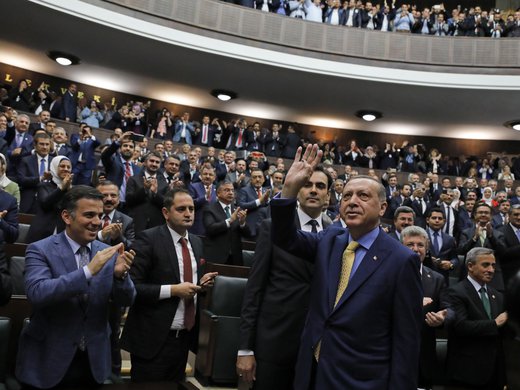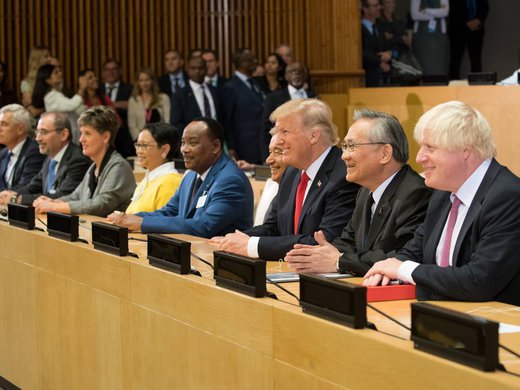The decision to use violence should never be cheered, but President Donald Trump’s recent military action against Syria for their use of chemical weapons on Douma should find support from a rare corner — liberal internationalists who believe that world politics should follow rules to quash society’s worst instincts.
Coming from a president who has relished carving out his own unique brand of American foreign policy, Trump’s explanation for military action hewed remarkably close to long-held American lines of thinking. Trump justified his administration’s decision by appealing to three — dare I say, liberal — foreign policy principles that have been endorsed by American presidents ranging from Woodrow Wilson to Barack Obama. President Trump (perhaps unknowingly) laid out an argument that the United States, by attacking Syria’s military, was enforcing two critical post-war principles and lending its political support to a third.
The first principle underpins much of international humanitarian law: during war, governments need to take all possible precautions to avoid putting civilians at risk. That means governments must not attack military targets if the risk of civilian death is disproportionate to the military goals they will achieve. It also practically forbids the use of indiscriminate weapons that cannot be reliably aimed at combatants while avoiding civilians. Using nerve agents in a densely populated urban environment without endangering civilians is practically impossible; most of the world banned chemical weapons in the 1990s, rendering them nearly universally illegal.
The second principle is that governments must honour their commitments. This is embodied in the legal maxim pacta sunt servanda (“agreements must be kept”), which underpins the basic logic of contracts, pacts and treaties: when parties sign them, they must intend to abide by them. Otherwise, legal agreements wouldn’t be worth the paper they are printed on. In 2013, when Syrian armed forces used sarin gas in the Damascus suburb of Ghouta, US President Barack Obama claimed Syrian President Bashar al-Assad had crossed a “red line” and that American military action was imminent. Instead, the Russian government ultimately brokered a deal where the Syrian government would give up its chemical weapons arsenal and join the Chemical Weapons Convention (CWC), the treaty that bans members from owning, producing and using chemical weapons. The CWC allows member states to withdraw from the treaty, an option that Syria ignored prior to its most recent chemical attack, effectively mocking the idea that it would live by its international legal promises.
The third principle is the idea that the nations of the world have common interests and should act together to achieve them. Competition is a natural feature of international politics, and in the extreme, it can be ruinous. It is, therefore, essential to deliberately collaborate with like-minded countries as much as possible, not just to achieve common goals, but to create semi-permanent alliances of states with common values. By operating alongside others — including France and the United Kingdom —Trump has made his action more legitimate. For once, the American president is not acting alone.
Perhaps the longest-standing challenge in international politics is how to enforce the rules that countries have — at least on paper and in words — agreed to live by. We often rely on international law to help define, monitor and enforce these rules, but international law is not a perfect analogue to domestic law. Yes, international courts and tribunals exist, but compelling heads of state to stand before them, or their governments to abide by their rulings, remains a tall order. When governments flout agreements — such as the prohibition on killing civilians, or promises to get rid of chemical weapons — sometimes the world has to resort to other ways of enforcing those legal principles.
The airstrikes on Syria’s armed forces are not an ideal solution to this enforcement problem, and frankly, they may not be legal under either American or international law. Airstrikes will be a more effective deterrent if the United States, France and the United Kingdom use them again to respond to future chemical weapons use, although doing so could also raise Moscow’s ire, in particular if Russia thinks the Americans want to topple Assad. Deft diplomacy and careful messaging will be essential to mitigate these challenges; there is no guarantee that the United States can hit the right balance between force and diplomacy. Punishing the Assad government for its reckless use of chemical weapons also does nothing to address the world’s failure to enforce the more general rule that combatants should not deliberately kill civilians in Syria. Last week’s military action is not a panacea for Syria’s problems, let alone the world’s.
But, last weeks’ airstrikes in Syria should prompt liberal-minded policy makers and observers to think and work more regularly on ways to solve the enforcement problem. The institutions in place to enforce the rules of war are in rough shape compared to the watchdogs regulating economic activities or trade, such as the World Trade Organization and the International Monetary Fund.
The only conflict management office in the world that claims binding legal powers and global jurisdiction — the United Nations Security Council — has failed, time and again, to act in Syria. The International Criminal Court — which has jurisdiction over crimes against humanity, war crimes and genocide — has been shunned by major military powers and cannot compel its signatories to refer suspects. Instead, the world relies on self-help measures — military action, sanctions and ad hoc diplomacy — conducted by small clubs of states (from formal groups such as NATO to “softer” institutions such as the Group of Seven or the Normandy Quartet) to enforce the rules.
These efforts can be effective on a case-by-case basis (the effort to keep Iran from developing a nuclear bomb via sanctions and negotiations is a good example). However, in the long run, self-appointed coalitions to run the world risk losing legitimacy.
If policy makers want international politics to follow some basic standards of decency, decorum and restraint, then they need to prioritize strategies to enforce those principles.
Going to war is never the ideal solution to any problem and should only be done with reluctance. But striking military targets to deter governments from using indiscriminate weapons against civilians in Syria was an ugly-but-necessary decision. The idea that governments should be bound by rules also requires that someone hold those governments to account when they trample them. For now, regardless of his motives, Trump is the president upholding those rules.



